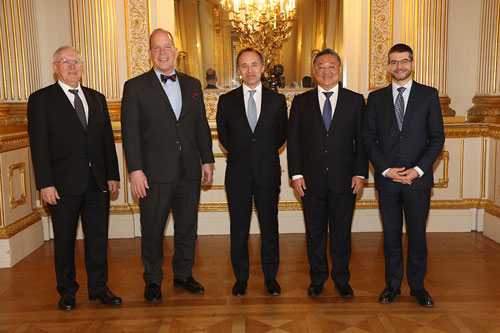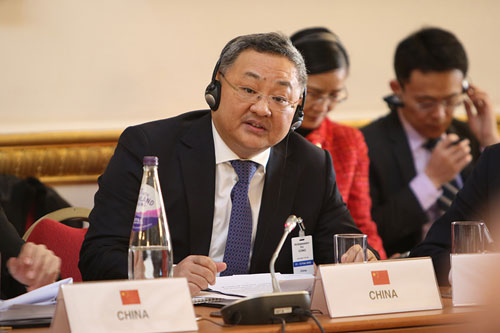
From February 12 to 13, 2020, the 9th formal annual meeting of the cooperation mechanism of the five nuclear-weapon states was held in London, the United Kingdom (UK). The meeting was chaired by Thomas Drew, Director General for Consular and Security at the Foreign and Commonwealth Office of the UK and attended by Christopher Ashley Ford, Assistant Secretary of State of the United States (US); Vladimir L. Leontiev, Deputy Director of the Department for Nonproliferation and Arms Control of the Ministry of Foreign Affairs of Russia; and David Bertolotti, Director of Strategic Affairs, Security and Disarmament of the Foreign Ministry of France. Fu Cong, Director-General of the Department of Arms Control of the Foreign Ministry of China led a delegation to attend the meeting.
Fu Cong expressed, the Treaty on the Non-Proliferation of Nuclear Weapons (NPT) is the cornerstone of the international nuclear disarmament and non-proliferation regime, and an essential part of the post-war international security system. The current world sees escalating competition among major countries, backpedaling of nuclear disarmament of the US and Russia, and accelerated development of new technologies used for military purposes, which harm the global strategic stability. Meanwhile, some countries pursue unilateralism, making it difficult to solve delayed regional hotspot issues. There is a rising tendency toward politicizing peaceful uses of nuclear energy, which interferes international cooperation. All of these have posed severe challenges to the NPT mechanism.
Fu Cong stressed, as the statutory nuclear-weapon states, the five nuclear-weapon states are responsible for strengthening coordination and cooperation, and ensuring the success of the tenth NPT Review Conference. First, we should adhere to multilateralism, firmly uphold the international order based on international law, uphold the vision of common, comprehensive, cooperative and sustainable security, and seek collective and universal security. Second, we need to strengthen dialogue on nuclear policy, work together to reduce nuclear risks, exercise restraint in strategic capacity building and deployment, maintain the existing international arms control system, and regulate the use of new technologies for military purposes, thus to maintain global strategic stability. Third, we should uphold international consensus on nuclear disarmament, advance political settlement of regional nuclear hotspot issue through diplomatic channels, create highlights in cooperation in the peaceful use of nuclear energy, and strengthen the NPT regime. Fourth, we should adhere to solidarity and cooperation, respect each other's concerns and safeguard common interests.
At the meeting, regarding China-US-Russia trilateral arms control negotiations, Fu Cong stressed, the Chinese side has an order-of-magnitude difference in nuclear forces from that of the US and Russia, which puts things in a completely different light. Therefore, it is neither fair nor reasonable to encourage the Chinese side to join trilateral arms control negotiations. As countries with the largest nuclear arsenals, the US and Russia should earnestly fulfill their special responsibility for nuclear disarmament, and work toward the extension of the New START Treaty and further slash their nuclear arsenals, so as to create conditions for other nuclear-weapon states to join the nuclear disarmament negotiations. If the US really intends to discuss strategic security issues, it could carry out cooperation through the mechanism of the five nuclear-weapon states.
The mechanism of the five nuclear-weapon states is a coordination mechanism formed by China, the US, Russia, the UK, and France in the NPT review process. It aims to maintain communication on strategic security issues and promote the international nuclear arms control process. This meeting focused on the current international strategic security situation and the cooperation of the five nuclear-weapon states in preparation for the tenth NPT Review Conference to be held this year. The heads of the delegation of the five countries also exchanged views with the presidium of the tenth NPT Review Conference, academic institutions and a vast number of non-nuclear-weapon states. Finally, the five countries formulated a work plan for the next stage and agreed to continue exchanges and cooperation on such issues as nuclear policy and strategy and reducing strategic risks.

